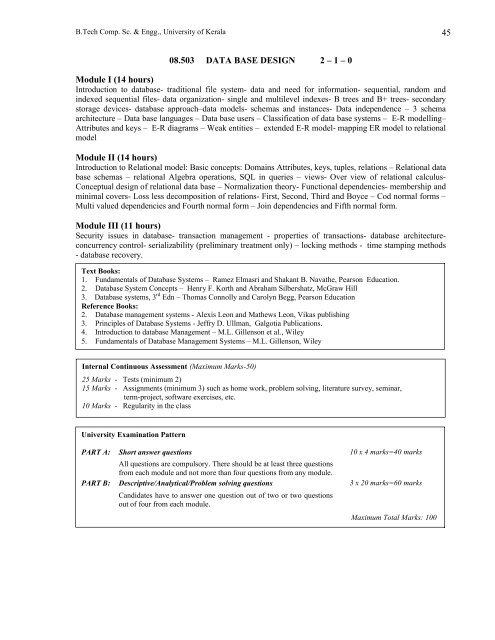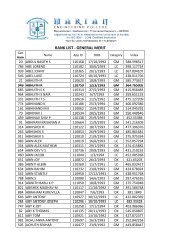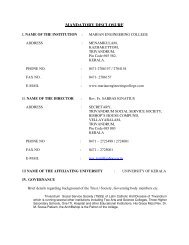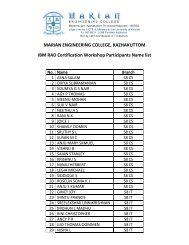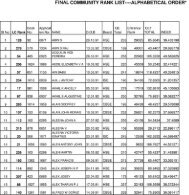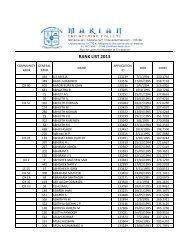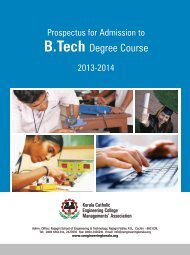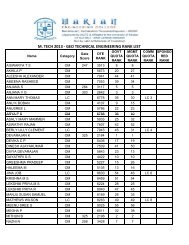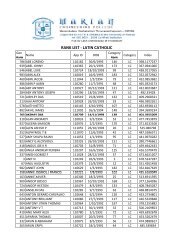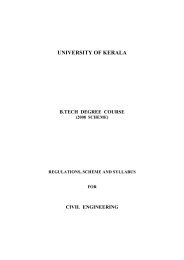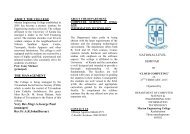UNIVERSITY OF KERALA - Marian Engineering College
UNIVERSITY OF KERALA - Marian Engineering College
UNIVERSITY OF KERALA - Marian Engineering College
Create successful ePaper yourself
Turn your PDF publications into a flip-book with our unique Google optimized e-Paper software.
B.Tech Comp. Sc. & Engg., University of Kerala 45<br />
08.503 DATA BASE DESIGN 2 – 1 – 0<br />
Module I (14 hours)<br />
Introduction to database- traditional file system- data and need for information- sequential, random and<br />
indexed sequential files- data organization- single and multilevel indexes- B trees and B+ trees- secondary<br />
storage devices- database approach–data models- schemas and instances- Data independence – 3 schema<br />
architecture – Data base languages – Data base users – Classification of data base systems – E-R modelling–<br />
Attributes and keys – E-R diagrams – Weak entities – extended E-R model- mapping ER model to relational<br />
model<br />
Module II (14 hours)<br />
Introduction to Relational model: Basic concepts: Domains Attributes, keys, tuples, relations – Relational data<br />
base schemas – relational Algebra operations, SQL in queries – views- Over view of relational calculus-<br />
Conceptual design of relational data base – Normalization theory- Functional dependencies- membership and<br />
minimal covers- Loss less decomposition of relations- First, Second, Third and Boyce – Cod normal forms –<br />
Multi valued dependencies and Fourth normal form – Join dependencies and Fifth normal form.<br />
Module III (11 hours)<br />
Security issues in database- transaction management - properties of transactions- database architectureconcurrency<br />
control- serializability (preliminary treatment only) – locking methods - time stamping methods<br />
- database recovery.<br />
Text Books:<br />
1. Fundamentals of Database Systems – Ramez Elmasri and Shakant B. Navathe, Pearson Education.<br />
2. Database System Concepts – Henry F. Korth and Abraham Silbershatz, McGraw Hill<br />
3. Database systems, 3 rd Edn – Thomas Connolly and Carolyn Begg, Pearson Education<br />
Reference Books:<br />
2. Database management systems - Alexis Leon and Mathews Leon, Vikas publishing<br />
3. Principles of Database Systems - Jeffry D. Ullman, Galgotia Publications.<br />
4. Introduction to database Management – M.L. Gillenson et al., Wiley<br />
5. Fundamentals of Database Management Systems – M.L. Gillenson, Wiley<br />
Internal Continuous Assessment (Maximum Marks-50)<br />
25 Marks - Tests (minimum 2)<br />
15 Marks - Assignments (minimum 3) such as home work, problem solving, literature survey, seminar,<br />
term-project, software exercises, etc.<br />
10 Marks - Regularity in the class<br />
University Examination Pattern<br />
PART A: Short answer questions 10 x 4 marks=40 marks<br />
All questions are compulsory. There should be at least three questions<br />
from each module and not more than four questions from any module.<br />
PART B: Descriptive/Analytical/Problem solving questions 3 x 20 marks=60 marks<br />
Candidates have to answer one question out of two or two questions<br />
out of four from each module.<br />
Maximum Total Marks: 100


